This summer, “beach money” will be released on Siaoliouciou (Little Liuqiu) for the first time.
This month, the Dapeng Bay National Scenic Area Administration (DBNSA) and Hiin Studio will jointly organize five beach cleanup relays for protecting turtles. In the events, every two kilograms of garbage the participants clean away can be exchanged for the beach money to be used at local businesses for actual discounts. A total of 74 local businesses have already said they will participate in the project.
Lin Peiyu of Hiin Studio is one of the event’s initiators. Lin says it is hoped the “beach money,” which was invented by a Japanese surfer and environmental activist, will raise awareness of the aggravating problem of floating marine debris. The beach money coins are made of waste glass with its sharp edges dulled, and adorned with beautiful turtle patterns.
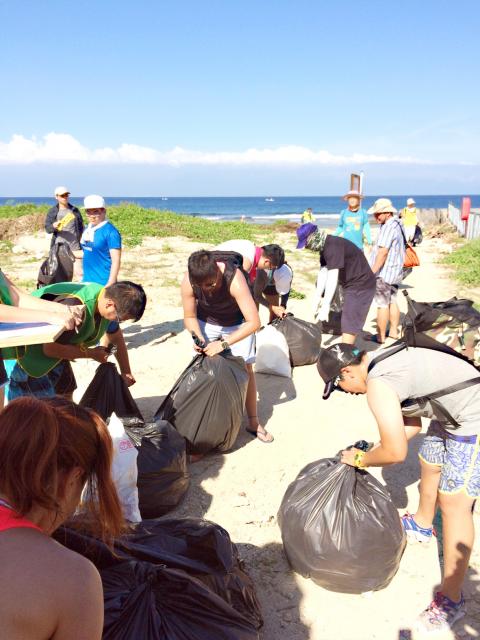
Photo copied by Yeh Yong-chien, Liberty Times
照片:自由時報記者葉永騫翻攝
There will be five separate beach cleanups, to be held on July 22, 23, 26, 29 and 30. Those who wish to participate can meet at the Little Liuqiu Visitor Center at 1pm on the day of the event, and there will be a fascinating presentation on green sea turtles before departing for the cleanup itself.
To reduce water and garbage waste, DBNSA urges that holiday visitors to Siaoliouciou reduce the use of sunscreen, and B&Bs refrain from changing sheets for visitors staying for multiple days.
(Liberty Times, translated by Lin Lee-kai)
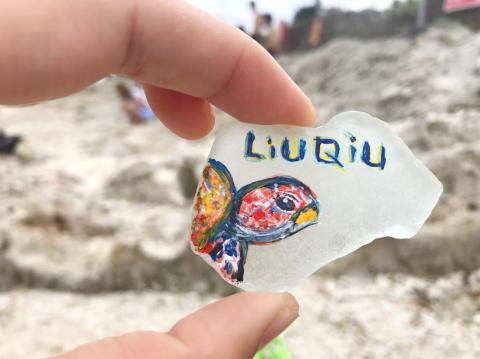
Photo Courtesy of Hiin Studio
照片:海湧工作室提供
全國首創的「海灘貨幣」,暑假將在小琉球發行流通!
大鵬灣國家風景區管理處與海湧工作室本月將合辦五場「愛龜淨灘接力賽」,每兩公斤垃圾就能兌換海灘貨幣在小琉球消費,現已有七十四個商家響應,提供折價方案。
海湧工作室林佩瑜是本活動發起人之一,她表示「Beach Money」海灘貨幣最早是由日本環保衝浪客所發起,希望藉此讓遊客注意到海漂垃圾日益嚴重的問題。海灘貨幣是由磨鈍的海漂玻璃製成,繪有精美的海龜圖騰。
「愛龜淨灘接力賽」活動的五個梯次分別為七月二十二、二十三、二十六、二十九、三十日;欲參加本活動之民眾可在當日下午一點至琉球遊客中心集合,出發前會有一場帶大家認識綠蠵龜的精采演說。
鵬管處呼籲小琉球遊客減少使用防曬乳,連續住宿則請民宿不更換寢具,渡假同時減少垃圾與廢水。
(自由時報記者陳彥廷)
DID YOU KNOW?
你知道嗎?
Marine debris is also known as marine litter. It is human-produced waste material either accidentally or intentionally released into water masses. Floating marine debris tends to accumulate on coastlines and often washes ashore, when it is called beach litter. Intentional disposal of waste in the ocean is known as ocean dumping.
Plastic debris is an increasingly worrying problem as plastics do not biodegrade. Fish, seabirds and marine mammals can consume plastic debris by mistake, clogging up their digestive tracts and thereby causing death by starvation or infection.
「海洋垃圾」英文為marine debris,亦作marine litter,指的是故意或無意丟棄至海域的人造廢棄物。海漂垃圾沖上岸後沿岸累積,便稱作「海灘垃圾」。若是把廢棄物以船舶等方式運送至其他海域棄置,則稱為「海洋傾倒」,或稱「海洋棄置」。
塑膠垃圾的問題越來越令人憂心,因為塑膠無法生物分解。魚類、海鳥、海洋哺乳類動物等都可能誤食塑膠垃圾,導致消化道堵塞,最後因飢餓或感染而死亡。
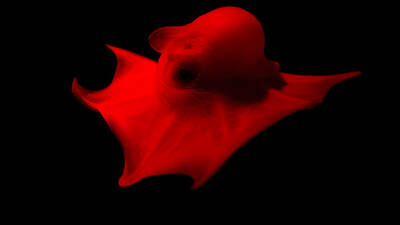
The deep waters off the coast of California are home to a bizarre creature: the flapjack octopus. This creature, known for its pancake-like appearance, spreads itself thin on the seabed as a clever survival strategy, making it difficult for predators to spot and capture it. With its unique, umbrella-shaped body formed by webbed arms, the flapjack octopus moves through the water in a graceful manner. It propels itself forward by rhythmically moving its body and contracting its webbed arms. Its pair of ear-like fins, which move independently yet with remarkable coordination, also help it explore the deep-sea environment. These
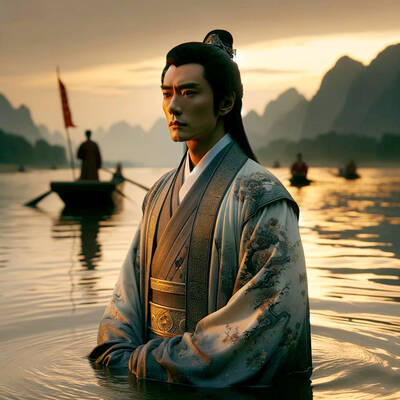
Bilingual Story is a fictionalized account. 雙語故事部分內容純屬虛構。 I stand by the Miluo River as dusk falls. The court betrayal is too much. I served Chu with loyalty. I forged alliances and fought corruption. But the whispers of jealous courtiers, the murmurs of treason, spoke louder. The king cast me out. The water looks calm. It promises peace. I step in. The river is cold against my legs. I hear shouts behind me — fishermen calling my name. I keep walking. The calls grow louder, but I do not turn around. The water rises to my chest. It pulls at me. I
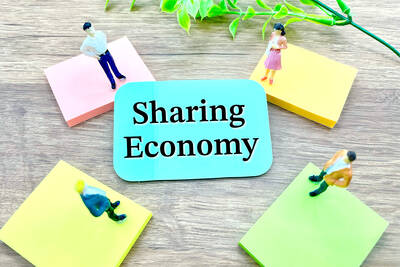
In Taiwan, people can use a platform to rent a power washer for a weekend or share unused garage space for someone’s storage needs. These are examples of the sharing economy, a consumption model that has gained widespread adoption worldwide. This approach allows people to rent or share assets like cars, homes or even services, typically through online platforms. This innovative model poses a simple yet powerful question: why purchase infrequently used items when sharing is more practical? By making useful but idle resources accessible, the sharing economy turns them into sustainable opportunities. Internationally, platforms like Airbnb and Uber have popularized
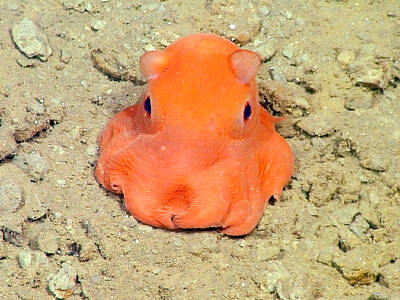
Continued from yesterday(延續自昨日) https://www.taipeitimes.com/News/lang Many people may be familiar with flapjack octopuses thanks to Pearl, a charming character from the Pixar film Finding Nemo. However, her portrayal presents several scientific inaccuracies. In reality, flapjack octopuses are deep-sea creatures, which are unsuitable for the brightly lit shallow reef environment depicted in the film. Their primary defense mechanism relies on their reddish coloration, which would be ineffective in the well-lit shallows. Pearl’s famous line, “You guys made me ink,” is another fictional detail that is not consistent with the observed actions of real flapjack octopuses. As common as it is in many other octopus